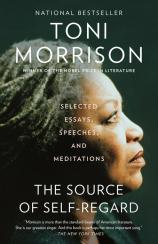The Source of Self-Regard: Selected Essays, Speeches, and Meditations
Review
The Source of Self-Regard: Selected Essays, Speeches, and Meditations
One of the best known and most appreciated writers of our time, Toni Morrison (THE BLUEST EYE, SULA, TAR BABY, JAZZ, BELOVED, PARADISE and more) offers a collection of her speeches, essays and thoughts about writing.
This array is personal, as when she recalls why she became a writer (“Faulkner and Women”); compassionate, as when she remembers “The Dead of September 11”; feminist (“Cinderella’s Stepsisters”); and, above all, African American, as in a large portion of the book BLACK MATTERS. In the latter segment, in an essay by that name, she presents the compelling idea that American writing has nearly always been about white, male Americans. Yet American Africanism (her term) was always there, on the sidelines, beneath the surface.
"This array is personal, as when [Morrison] recalls why she became a writer...feminist...and, above all, African American..."
One case in point is a work titled VOYAGERS TO THE WEST that describes pioneer William Dunbar, an aristocratic, “enlightened” Scot who acquired his piece of the American dream with the labor of slaves. He once condemned two runaways to a total of 2,500 lashes and “to carry a chain & log fixt to the ancle.” That Dunbar is an American whose accomplishments are extoled is an overt example that, as Morrison suggests, behind every story of a white person’s success there have been the mute voices, the ignored lives of black and native people. Africans, when depicted at all by white writers, were “decorative.” The very designation “American” for most of our history, in all spheres of life, denoted only white people. Yet the Africanist presence, Morrison asserts, is essential to the meaning of Americanism, embodying so well the fine ideals of rights and freedom.
In this wide-ranging assortment, Morrison, who is among the most talented wordsmiths who ever put fingers to typewriter, notes the way that jazz brought American blacks into a kind of public legitimacy; how even Mark Twain couldn’t let Jim free himself, but had to use a plot device to effect what the man obviously deserved; why American and English writers could not speak for people of color, so her and others like her, who had always been imagining themselves, had to break the literary race barrier. In her poignant tribute, “James Baldwin Eulogy,” she honors and thanks this early creator for his language, courage and tenderness: “You went into forbidden territory and decolonized it.”
Morrison states that she became a writer without meaning to do so, that she completed her first book “so that I could have a good time reading it.” But when she also avers that “Writers are among the most sensitive, most intellectually anarchic, most representative, most probing of artists,” she surely must be aware that she herself personifies those characteristics, and that her large and loyal readership will recognize her in those words.
Reviewed by Barbara Bamberger Scott on February 15, 2019
The Source of Self-Regard: Selected Essays, Speeches, and Meditations
- Publication Date: January 14, 2020
- Genres: Essays, Nonfiction
- Paperback: 368 pages
- Publisher: Vintage
- ISBN-10: 0525562796
- ISBN-13: 9780525562795




